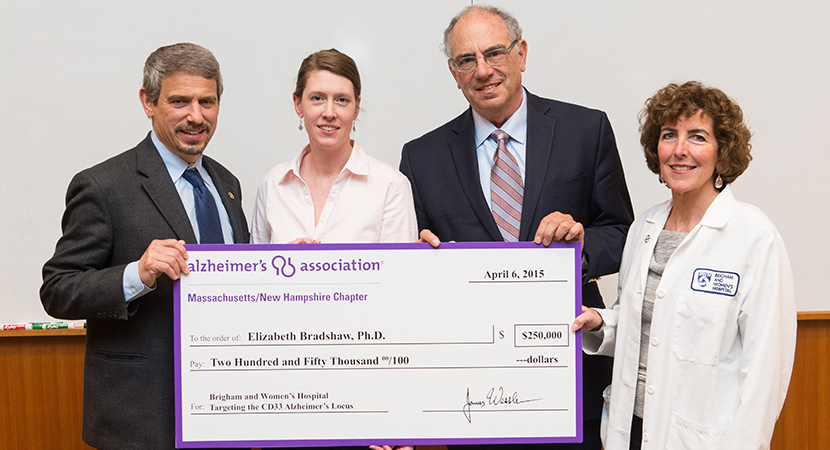
Alzheimer's Association Sustains Critical Research
This story originally appeared in the Fall 2015 issue of the Life.Giving.Breakthroughs. donor newsletter.
With the U.S. adult population aged 65 and older expected to grow to 70 million by 2030, and the number of people living with Alzheimer’s tripling by 2050, “the human cost, financial cost, and health system cost is unimaginable,” says James Wessler, president and CEO of the Alzheimer’s Association, Massachusetts/New Hampshire Chapter.
“That’s why the Alzheimer’s Association is dedicated to combating this disease on multiple fronts, including public policy, research, and fundraising,” he continues. “Since 1990, researchers at the Brigham have received numerous grants from us totaling nearly $10 million. We have a very competitive international peer-reviewed process, so this is a high endorsement of the caliber of the research there.”
Most recently, in April, the association presented a three-year $250,000 grant to Elizabeth “Betsy” Bradshaw, PhD, assistant scientist in the Ann Romney Center for Neurologic Diseases at BWH.
The center’s co-director Howard L. Weiner, MD, describes Bradshaw as “a highly regarded researcher who is helping us understand the role of the immune system in susceptibility to Alzheimer’s disease.”
Cynthia Lemere, PhD, an associate neuroscientist at BWH and a colleague of Bradshaw, adds, “Betsy is investigating the effects of two possible drug candidates on reducing a certain protein found on the surface of immune cells to decrease Alzheimer’s disease risk. Targeting the immune system is a relatively new approach in drug discovery for Alzheimer’s therapy, and her study is groundbreaking.”
For Bradshaw, this grant is crucial and has the potential to open opportunities down the road. “Without funding, our study simply cannot happen,” she says. “Being selected shows that experts in the field think our line of questioning is worth pursuing, and I’m so grateful.”
Wessler notes that the association invests in the ideas of young investigators, such as Bradshaw, as well as veterans in the field involved in a range of projects—from basic science to therapeutic-directed work.
Lemere’s laboratory, for example, has received three awards from the association. “My first grant as an independent scientist was an Alzheimer’s Association award that allowed me to develop my vaccine project and obtain federal funding to continue this work over the past 14 years,” she says. “Grants from the association have provided essential support to explore new approaches for treatment.”
Wessler looks forward to seeing what ideas come next. “We see BWH scientists as part of an international team that will help understand the basic causes of this disease, develop reliable biomarkers, and ultimately lead to significant candidates for treatment,” he says. “The Brigham is one of our top research partners in the country, if not the world.”
Alzheimer’s Association video interviews with BWH researchers can be found at alz.org/manh under Alztalks.